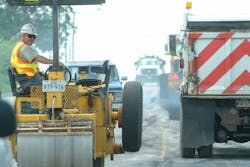UPDATED 12/05/13: House bill would up fuel tax and index it to inflation
Pushing hard against the view held by at least some Members of Congress that Federal infrastructure funding should be “devolved” to the states and even to private sources, Rep. Earl Blumenauer (D-OR) today introduced a bill that would raise the federal fuel tax by 15 cents and index further such increases to the rate of inflation.
H.R. 3636-- a.k.a the Update, Promote, and Develop America’s Transportation Essentials (UPDATE) Act-- “phases in a 15-cent gas tax increase starting in 2014, indexes the gas tax to inflation, and then confirms Congress’s intention to replace the gas tax with a more equitable, stable source of funding by 2024,” said Rep. Blumenauer in a statement.
The bill includes a "statement of dedication" to repeal the fuel tax by 2024 and replace with a "more stable and sustainable" revenue source.
Given that the measure would raise a tax and is sponsored by a Democrat in the GOP-controlled House while also lacking (at this writing) a Republican co-sponsor, passage of the measure appears to be a long shot at best.
On the other hand, Congress has just ten months until the next surface-transportation bill is due-- and little if any movement on how to pay for its provisions has yet been discerned.
If nothing else, Blumenauer’s bill may provide some impetus for realistic discussions on Capitol Hill of this crucial issue for trucking.
Another illuminating backdrop to the UPDATE Act is that several states concerned about how infrastructure funding will play out recently opted to increase fuel taxes on their own.
Also providing the legislation with a degree of political cover, Blumenauer pointed out that the bill hews to the recommendation of the U.S. Government’s bipartisan National Commission on Fiscal Responsibility and Reform (which in part is charged with addressing gaps between projected revenues and Federal expenditures) that the fuel tax be increased by 15 cents per gallon.
“We should end the transfer of General Fund dollars to the Highway Trust Fund, phase in a short-term gas tax increase, and set the stage for a transition for a long-term, stable funding source that will replace the gas tax,” stated Blumenauer. “American cannot afford to continue to disinvest in our infrastructure.
Trucking’s chief lobby, the American Trucking Assns. (ATA) is squarely backing H.R. 3636.
ATA is “very pleased to support Congressman Blumenauer’s proposal to increase and index the federal fuel tax,” said ATA president & CEO Bill Graves.
“Underinvestment in highways is an enormous burden on the trucking industry, raising the cost of moving freight and undermining the reliability of a logistics system that is critical to our nation’s competitiveness,” he continued.
“The additional investment in highway projects made possible by this new revenue will significantly improve the safety, reliability and efficiency of the trucking industry, to the benefit of all Americans,” Graves added.
Mary Phillips, ATA’s senior vp of legislative affairs, observed that “if the [highway] users tell Congress ‘We support paying more to support our roads,’ we hope Congress will listen.”
ATA Chairman Phil Byrd, president of Charleston-based Bulldog Hiway Express, bluntly stated that “for years, the trucking industry has been urging someone to put a fuel tax increase on the table, and Congressman Blumenauer’s bill does just that.
“The fuel tax is our most efficient and effective way of funding the improvements and repairs our highways and bridges so desperately need,” he added.
Also throwing its support behind the UPDATE Act is the Coalition for America’s Gateways and Trade Corridors (CAGTC). The lobbying group's executive director Leslie Blakey said that it "applauds Congressman Blumenauer’s leadership in proposing an increase to the federal motor fuel taxes.
"Not precluding other potentially viable revenue sources, we see the proposed increase in the federal gasoline and diesel fuel taxes as a crucial step in the right direction and believe the consequences of inaction in addressing the transportation funding crisis are serious," Blakey continued. "CAGTC recognizes the UPDATE Act as an important piece of the total financing package needed to build freight infrastructure projects and defend our national competitiveness.”
Blumenauer noted that the federal fuel tax last went up in 1993 by 4.3 cents (to a total of 18.4 cents per gallon) as part of the Omnibus Budget Reconciliation Act and prior to that, it was upped by a nickel in 1982 during the Reagan Administration.
UPDATE 12/05/13:
A day after the UPDATE Act was announced, the Politico.com Morning Transportation blog reported that Blumenauer declared at the announcement that "There's exactly no other cosponsors. And that's deliberate."
The Dec. 5th post by reporter Adam Snider then stated that the Congressman added that "a Republican pulled me aside on the House floor and said he's really thinking about cosponsoring the bill. I said 'wait a minute, hold on, let's get this out and let's see what we can do in terms of starting the conversation.'"
Snider also revealed that the potential GOP co-sponsor “confirmed his interest but said he'd have to deny it if it was ever printed with his name attached.”
This anonymous confirmation, observed the reporter, “shows that while the gas tax is still a political landmine, it has more Congressional support than you might think-- definitely more than lawmakers are willing to admit in public.”
